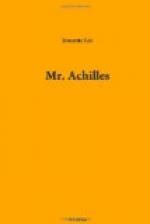Miss Stone started. They had waited a long time—but not for this. “Yes, Alcie, once you saw me—go on—”
“—saw you—in a carriage,” finished Alcie, with quick smile. “You ride straight—you—straight—now.” He looked at her with devoted eyes.
“Yes.” She was holding her breath, very evenly—and she did not look at him, but at the distant river. They seemed held in a charm—a word might break it.
The boy breathed a happy sigh—that bubbled forth. “I like it—here,” he said dreamily.... Should she speak?
The long silence spread between them. The bird sang in the wood—a clear, mid-summer call.
The boy listened, and turned his eyes. “A little girl—with you then,” he said softly, “in carriage. Where is little girl?” It was the first question he had asked.
She swayed a little—in her grey softness—but she did not look at him, but at the river. “You would like that little girl, Alcie,” she said quietly. “We all love her. Some day you shall see her—only get well and you shall see her.” It was a soft word, like a cry, and the boy looked at her with curious eyes.
“I get well,” he said contentedly, “I see her.” He slipped a hand under his cheek and lay quiet.
“Doing well,” said the surgeon, “couldn’t be better.” He had run down for the day and was to go back in the cool evening.
He stood with Philip Harris on the terrace overlooking the river. Harris threw away a stump of cigar. “You think he will make complete recovery?”
“No doubt of it,” said the surgeon promptly.
“Then—?” Philip Harris turned a quick eye on him.
But the man shook his head. “Wait,” he said—and again, slowly, “wait.”
The darkness closed around them, but they did not break it. A faint questioning honk sounded, and Philip Harris turned. “The car is ready,” he said, “to take you back.”
XIX
A WOMAN IN THE GARDEN
“When it comes, it may come all at once,” the surgeon had said, “and overwhelm him. Better lead up to it—if we can—let him recall it—a bit here—a bit there—feel his way back—to the old place—to himself.”
“Where my child is,” said Philip Harris.
“Where your child is,” repeated the surgeon, “and that clue runs through the frailest, intangiblest matter that fingers ever touched.” He had looked down at his own thin, long, firm fingers as if doubting that they could have held that thread for a moment and left it intact.
Philip Harris moved restively a little, and came back. “There has not been a word for seven weeks,” he said, “not a breath—”
“They told you—?” said the surgeon.
“That they would wait three months! Yes!” Philip Harris puffed fiercely. “It is hell!” he said.
“The boy is better,” said the surgeon. “You have only to wait a little longer now.”




